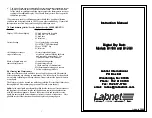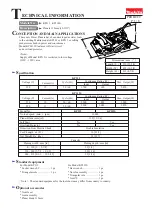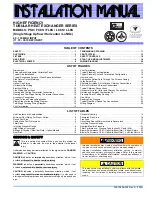
How to Use This Table
1. Determine your supply voltage.
2. Determine the total length of your cord including all extension cords.
3. Determine the maximum amp draw for your machine.
4.
Trace your voltage across the top of the table to the first length that is greater than or equal to your cord length.
5.
Follow the column down to the first row that contains a maximum amp draw greater than or equal to yours.
6. This cell contains the minimum wire size for your application.
Example
Application:
Max Amps = 11A, Length = 40ft, Voltage = 120V
Solution:
40ft is between the 25ft and 50ft columns, so the larger of the two col-
umns is chosen. Likewise, 11A is between the 10A and 12A rows, so the larger of
the two rows is chosen. 14 AWG (2.5mm
2
) is the minimum recommended wire size
for this example.
Extension Cord Sizes
Safety
10
ELECTRICAL PRACTICES (CONT’D)
Single Phase Equipment
Max
Length
120V Supply
25ft (7.5m)
50ft (15m)
75ft (25m)
100ft (30m)
150ft (45m)
200ft (60m)
230V Supply
50ft (15m)
100ft (30m)
150ft (45m)
200ft (60m)
300ft (90m)
400ft (120m)
Max Amps
Minimum Wire Size
8
16 AWG (1.5mm
2
) 16 AWG (1.5mm
2
) 16 AWG (1.5mm
2
) 16 AWG (1.5mm
2
) 14 AWG (2.5mm
2
) 14 AWG (2.5mm
2
)
10
16 AWG (1.5mm
2
) 16 AWG (1.5mm
2
) 16 AWG (1.5mm
2
) 16 AWG (1.5mm
2
) 14 AWG (2.5mm
2
)
12 AWG (4mm
2
)
12
14 AWG (2.5mm
2
) 14 AWG (2.5mm
2
) 14 AWG (2.5mm
2
) 14 AWG (2.5mm
2
)
12 AWG (4mm
2
)
12 AWG (4mm
2
)
14
14 AWG (2.5mm
2
) 14 AWG (2.5mm
2
) 14 AWG (2.5mm
2
) 14 AWG (2.5mm
2
)
12 AWG (4mm
2
)
10 AWG (6mm
2
)
16
14 AWG (2.5mm
2
) 14 AWG (2.5mm
2
) 14 AWG (2.5mm
2
) 14 AWG (2.5mm
2
)
12 AWG (4mm
2
)
10 AWG (6mm
2
)
18
14 AWG (2.5mm
2
) 14 AWG (2.5mm
2
) 14 AWG (2.5mm
2
)
12 AWG (4mm
2
)
12 AWG (4mm
2
)
10 AWG (6mm
2
)
20
12 AWG (4mm
2
)
12 AWG (4mm
2
)
12 AWG (4mm
2
)
12 AWG (4mm
2
)
10 AWG (6mm
2
)
10 AWG (6mm
2
)
25
12 AWG (4mm
2
)
12 AWG (4mm
2
)
12 AWG (4mm
2
)
12 AWG (4mm
2
)
10 AWG (6mm
2
)
8 AWG (10mm
2
)
30
10 AWG (6mm
2
)
10 AWG (6mm
2
)
10 AWG (6mm
2
)
10 AWG (6mm
2
)
8 AWG (10mm
2
)
8 AWG (10mm
2
)
Note:
The table is based on a <10% voltage loss, data from the U.S. National Electrical Code Tables 400.5(A) & 400.5(B) and typical resis-
tances for copper wire.
402306_A95_RevH











































